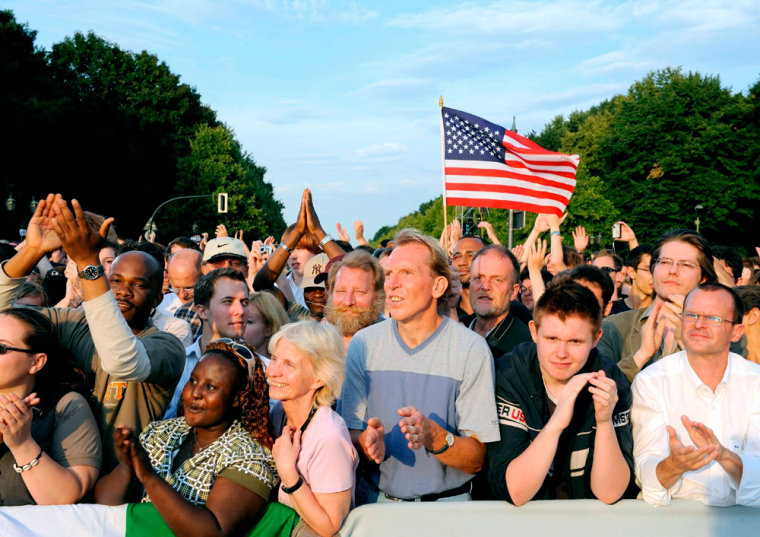Before the largest crowd of his campaign, Democratic presidential contender Barack Obama on Thursday summoned Europeans and Americans together to "defeat terror and dry up the well of extremism that supports it" as surely as they conquered communism a generation ago.
"The walls between old allies on either side of the Atlantic cannot stand," Obama said, speaking not far from where the Berlin Wall once divided the city.
"The walls between the countries with the most and those with the least cannot stand. The walls between races and tribes, natives and immigrants, Christian and Muslim and Jew cannot stand," he said.
Obama said he was speaking as a citizen, not as a president, but the evening was awash in politics. His remarks inevitably invited comparison to historic speeches in the same city by Presidents John F. Kennedy and Ronald Reagan, and he borrowed rhetoric from his own appeals to campaign audiences in the likes of Berlin, N.H., when he addressed a crowd in one of the great cities of Europe.
'This is our moment'
"People of Berlin, people of the world, this is our moment. This is our time," he said.
Obama's speech was the centerpiece of a fast-paced tour through Europe designed to reassure skeptical voters back home about his ability to lead the country and take a frayed cross-Atlantic alliance in a new direction after eight years of the Bush administration.
Republicans, chafing at the media attention Obama's campaign-season trip has drawn, sought to stoke doubts abut his claims.
In Die Welt, the German publication, Rep. Thaddeus McCotter, R-Mich., said: "No one knows which Obama will show. Will it be the ideological, left-wing Democratic primary candidate who vowed to 'end' the war rather than win it, or the Democratic nominee who dismisses the progressing coalition victory as a 'distraction'? Will it be the American populist who has told supporters in the United States that he will demand more from our allies in Europe and get it, or the liberal internationalist hell-bent on being liked in Europe's salons?"
Obama met earlier in the day with German Chancellor Angela Merkel for a discussion that ranged across the wars in Iraq and Afghanistan, climate change, energy issues and more.
No nukes
Knots of bystanders waited along Obama's motorcade route for him to pass. One man yelled out in English, "Yes, we can," the senator's campaign refrain, when he emerged from his car to enter his hotel.
Obama drew loud applause as he strode confidently across a large podium erected at the base of the Victory Column in Tiergarten Park in the heart of Berlin.
Police spokesman Bernhard Schodrowski said the speech drew more than 200,000 people, more than double the estimated 75,000 he drew in Oregon this spring.
He drew loud applause when he talked of a world without nuclear weapons and again when he called for steps to counter climate change.
Stakeholders in peace
Obama mentioned Iraq, a war he has opposed from the start, only in passing. But in discussing Afghanistan, he said, "no one welcomes war. ... But my country and yours have a stake in seeing that NATO's first mission beyond Europe's borders is a success."
He referred repeatedly to the Berlin airlift, launched by the Allies 60 years ago when the Russians sought to isolate the Western part of the city. If they had succeeded, he said, communism would have marched across Europe.
"Where the last war had ended, another World War could have easily begun," the presidential candidate said.
Threats of terrorism
Now, he said, the enemy is different but the need for an alliance is the same as the world stares down terrorism and the extremism that supports it. "This threat is real and we cannot shrink from our responsibility to combat it," he said.
He said Europeans sometimes view America as "part of what has gone wrong in our world, rather than a force to help make it right ..." And in America, "there are voices that deride and deny the importance of Europe's role in our security and our future."
He said both views miss the truth, "that Europeans today are bearing new burdens and taking more responsibility in critical parts of the world; and that just as American bases built in the last century still help to defend the security of this continent, so does our country still sacrifice greatly for freedom around the globe."
In any event, he said, there will always be differences.
"But the burdens of global citizenship continue to bind us together. A change of leadership in Washington will not lift this burden. In this new century, Americans and Europeans alike will be required to do more, not less."
